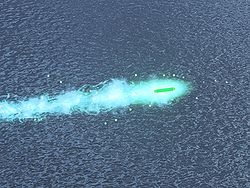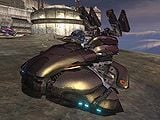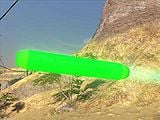Fuel rod: Difference between revisions
From Halopedia, the Halo wiki
| Line 22: | Line 22: | ||
*''[[Halo 3: ODST]]'' | *''[[Halo 3: ODST]]'' | ||
*''[[Halo: Reach]]'' | *''[[Halo: Reach]]'' | ||
*''[[Halo 4]]'' | |||
*''[[Halo: The Flood]]'' | *''[[Halo: The Flood]]'' | ||
*''[[Halo: First Strike]]'' | *''[[Halo: First Strike]]'' | ||
| Line 27: | Line 28: | ||
*''[[Halo: Helljumper]]'' | *''[[Halo: Helljumper]]'' | ||
*''[[Halo Legends]]'' | *''[[Halo Legends]]'' | ||
==Sources== | ==Sources== | ||
<references/> | <references/> | ||
[[Category:Ammunition]] | [[Category:Ammunition]] | ||
Revision as of 03:40, July 24, 2013
Fuel rod is a colloquial name for a form of explosive munitions used in several Covenant weapon systems.[1] Fuel rods are caseless, transparent projectiles,[1] containing green, radioactive material.[2] Once they strike the target, the radioactive materials contained in the projectile detonate.
Fuel rods come in several types, including Class-2 and Class-3. The Class-2 fuel rods are unguided, 38mm in diameter, and are used in the Type-33 Light Anti-Armor Weapon.[1] The fuel rod cannons mounted on the Anti-air Wraith and the Banshee use the heavier Class-3 fuel rods, which have a greater range and a capability to track heat signatures.[3] The rounds fired by the Type-51 Carbine are similar to fuel rods, on a smaller scale and without their explosive effects.
Fuel rods are most often used in an anti-armor or anti-air role, but are also devastatingly effective against infantry.[1] They are essentially the Covenant equivalent to the UNSC's M19 surface-to-surface missiles.
Though widely used among UNSC personnel, "fuel rod" is actually an informal term supposedly originating from common popular culture depictions of nuclear fuel rods.[2] Rumors surround fuel rods, with many UNSC Marines under the apparent belief that even carrying a weapon that uses them for ammunition can cause Boren's Syndrome.[4]
Gallery
List of appearances
- Halo: Combat Evolved (First appearance)
- Halo 2
- Halo 3
- Halo 3: ODST
- Halo: Reach
- Halo 4
- Halo: The Flood
- Halo: First Strike
- Halo: Graphic Novel
- Halo: Helljumper
- Halo Legends
Sources
- ^ a b c d Halo: The Essential Visual Guide, page 77
- ^ a b Bungie.net - Type-33 Light Anti-Armor Weapon
- ^ Halo: The Essential Visual Guide, page 9
- ^ Bungie.net - Type-51 Carbine


